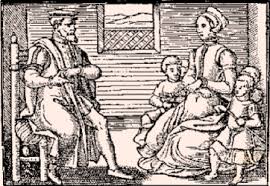1. «The Comedy of Errors»
Read the comedy here!
**********************KEY FACTS****************************
Type of Work: The play is a comedy that veers toward farce and burlesque. It is sometimes classified as a «comedy of intrigue» or a «comedy of situation.» With approximately 16,250 words, The Comedy of Errors is Shakespeare’s shortest play.
Date Written: Early 1590’s.
First Performance: Probably December 28, 1594, at Gray’s Inn in London, one of four «Inns of Court,» establishments for educating members of the legal profession.
***************************************************************************
Women are very present in The Comedy of Errors as vocal forces. Though they have a lot of opinions and many speaking lines, it seems their main reason for existing in the play is to talk about and react to men. For that reason, I am going to focus my study on Adriana, wife of Antipholus of Ephesus, and Luciana, Adriana’s unmarried sister. Through several dialogs we will see the different perspectives on marriage offered in The Comedy of Errors by these two female characters.

"The Comedy of Errors". From The Complet Works of William Shakespeare
The central marriage in the play is that of Adriana and Antipholus of Ephesus,and it does not seem to be a happy one. In this play, we can clearly observe that the identity of Adriana is fringed upon that of her husband, in fact, at that time the woman was seen as an extension of the man. Women were objects of male desire and dependent on that desire for their status, livelihood and even their lives. They accepted their husband as teacher and master.
In act II scene I Adriana seems to be a different woman from the others. Adriana, in a debate with Luciana, asserts her independence and power within her marriage and she believes that women should have as much freedom as men:
ADRIANA
Neither my husband nor the slave return’d,
That in such haste I sent to seek his master!
Sure, Luciana, it is two o’clock.
LUCIANA
Perhaps some merchant hath invited him,
And from the mart he’s somewhere gone to dinner.
Good sister, let us dine and never fret:
A man is master of his liberty:
Time is their master, and, when they see time,
They’ll go or come: if so, be patient, sister.
ADRIANA
Why should their liberty than ours be more?
LUCIANA
Because their business still lies out o’ door.
ADRIANA
Look, when I serve him so, he takes it ill.
LUCIANA
O, know he is the bridle of your will.
ADRIANA
There’s none but asses will be bridled so.
LUCIANA
Why, headstrong liberty is lash’d with woe.
There’s nothing situate under heaven’s eye
But hath his bound, in earth, in sea, in sky:
The beasts, the fishes, and the winged fowls,
Are their males’ subjects and at their controls:
Men, more divine, the masters of all these,
Lords of the wide world and wild watery seas,
Indued with intellectual sense and souls,
Of more preeminence than fish and fowls,
Are masters to their females, and their lords:
Then let your will attend on their accords.
ADRIANA
This servitude makes you to keep unwed.
LUCIANA
Not this, but troubles of the marriage-bed.
ADRIANA
But, were you wedded, you would bear some sway.
LUCIANA
Ere I learn love, I’ll practise to obey.
ADRIANA
How if your husband start some other where?
LUCIANA
Till he come home again, I would forbear.
ADRIANA
Patience unmoved! no marvel though she pause;
They can be meek that have no other cause.
A wretched soul, bruised with adversity,
We bid be quiet when we hear it cry;
But were we burdened with like weight of pain,
As much or more would we ourselves complain:
So thou, that hast no unkind mate to grieve thee,
With urging helpless patience wouldst relieve me,
But, if thou live to see like right bereft,
This fool-begg’d patience in thee will be left.
LUCIANA
Well, I will marry one day, but to try.
Here comes your man; now is your husband nigh.
(Act II scene I)
As Luciana , other characters, locate the blame of the unhappy marriage in the jealousy of Adriana, who is, indeed, portrayed as the kind of shrewish woman often found in the English plays of the period, including Shakespeare’s own The Taming of the Shrew. Still, the playwright’s sympathies seem to lie more with Adriana than with her simpering sister, who mouth conventional marital wisdom of the era. Actually, Luciana says that Adriana has been too jealous that has driven her husband insane with her bullying and prodding, when it is a woman’s place to be docile; however, her husband’s odd behavior has nothing to do with her and is the result of highly improbable circumstances. taking that into acount, I think that, far from supporting Luciana and the Abbess in their condemnations, Shakespeare is satirizing perspectives on marriage that would soon be out-of-date even in his era.
Back to the dialogue shown above, when Dromio of Ephesus enters in the scene, Adriana changes her attitude. She has so utterly sunk her identity into her role as wife that she believes that she and her husband are one indivisible whole:
ADRIANA
But say, I prithee, is he coming home? It seems he
hath great care to please his wife.
DROMIO OF EPHESUS
Why, mistress, sure my master is horn-mad.
ADRIANA
Horn-mad, thou villain!
DROMIO OF EPHESUS
I mean not cuckold-mad;
But, sure, he is stark mad.
When I desired him to come home to dinner,
He ask’d me for a thousand marks in gold:
»Tis dinner-time,’ quoth I; ‘My gold!’ quoth he;
‘Your meat doth burn,’ quoth I; ‘My gold!’ quoth he:
‘Will you come home?’ quoth I; ‘My gold!’ quoth he.
‘Where is the thousand marks I gave thee, villain?’
‘The pig,’ quoth I, ‘is burn’d;’ ‘My gold!’ quoth he:
‘My mistress, sir’ quoth I; ‘Hang up thy mistress!
I know not thy mistress; out on thy mistress!’
LUCIANA
Quoth who?
DROMIO OF EPHESUS
Quoth my master:
‘I know,’ quoth he, ‘no house, no wife, no mistress.’
So that my errand, due unto my tongue,
I thank him, I bare home upon my shoulders;
For, in conclusion, he did beat me there.
ADRIANA
Go back again, thou slave, and fetch him home.
DROMIO OF EPHESUS
Go back again, and be new beaten home?
For God’s sake, send some other messenger.
ADRIANA
Back, slave, or I will break thy pate across.
DROMIO OF EPHESUS
And he will bless that cross with other beating:
Between you I shall have a holy head.
ADRIANA
Hence, prating peasant! fetch thy master home.
DROMIO OF EPHESUS
Am I so round with you as you with me,
That like a football you do spurn me thus?
You spurn me hence, and he will spurn me hither:
If I last in this service, you must case me in leather.
Exit
LUCIANA
Fie, how impatience loureth in your face!
ADRIANA
His company must do his minions grace,
Whilst I at home starve for a merry look.
Hath homely age the alluring beauty took
From my poor cheek? then he hath wasted it:
Are my discourses dull? barren my wit?
If voluble and sharp discourse be marr’d,
Unkindness blunts it more than marble hard:
Do their gay vestments his affections bait?
That’s not my fault: he’s master of my state:
What ruins are in me that can be found,
By him not ruin’d? then is he the ground
Of my defeatures. My decayed fair
A sunny look of his would soon repair
But, too unruly deer, he breaks the pale
And feeds from home; poor I am but his stale.
(Act II scene I)
Luciana’s sense of identity within marriage, in her way, contrast with Adriana’s. She believes that men are naturally lords over their wives, and wants to learn to obey before she learns to love ( «Ere I learn love, I’ll practise to obey». Act I scene II). At the end, she pairs up with Antipholus of Syracuse. He offers to take a submissive role in the relationship, he wants her to teach him how to think and speak.
As we have seen, Shakespeare presents in this comedy 2 different views of marriage and women role but, though Adriana could be seen as a jealous, shrewish wife in the first dialog show above , she seems obliged to behave properly on her role of wife and wealthy woman in order to fit in the society, accepting in front of them the ideas represented in the comedy by her sister Luciana, being obedient and submissive to her husband.
******************************************************************
******************************************************************
Related posts:
Men and women roles in Elizabethan society.




